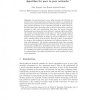Free Online Productivity Tools
i2Speak
i2Symbol
i2OCR
iTex2Img
iWeb2Print
iWeb2Shot
i2Type
iPdf2Split
iPdf2Merge
i2Bopomofo
i2Arabic
i2Style
i2Image
i2PDF
iLatex2Rtf
Sci2ools
BERTINORO
2005
Springer
2005
Springer
Design and Analysis of a Bio-inspired Search Algorithm for Peer to Peer Networks
Decentralized peer to peer (p2p) networks like Gnutella are attractive for certain applications because they require no centralized directories and no precise control over network topology or data placement. The greatest advantage is the robustness provided by them. However, flooding-based query algorithms used by the networks produce enormous amounts of traffic and substantially slow down the system. Recently, flooding has been replaced by more efficient k-random walkers and different variants of such algorithms. In this paper, we report immune-inspired algorithms for searching peer to peer networks. The algorithms use the immune-inspired mechanism of affinity-governed proliferation to spread query message packets in the network. Through a series of experiments, we compare the proliferation mechanism with different variants of random walk algorithms. The detailed experimental results show message packets undergoing proliferation spread much faster in the network and consequently p...
BERTINORO 2005 | Information System | Proliferation Algorithms | Random Walk Algorithms | flooding-based Query Algorithms |
Related Content
| Added | 26 Jun 2010 |
| Updated | 26 Jun 2010 |
| Type | Conference |
| Year | 2005 |
| Where | BERTINORO |
| Authors | Niloy Ganguly, Lutz Brusch, Andreas Deutsch |
Comments (0)

